Reaffirming the commitment to proactive climate adaptation and promoting international cooperation.
On November 19, 2024, the Prime Minister of Viet Nam issued Decision No. 1422/QĐ-TTg, officially approving the updated National Adaptation Plan (NAP) for the period 2021–2030, with a vision to 2050. In line with the Government’s directive, the Ministry of Agriculture and Environment (formerly the Ministry of Natural Resources and Environment) led the development and completion of the updated NAP Report, which has been submitted to the Secretariat of the United Nations Framework Convention on Climate Change (UNFCCC).
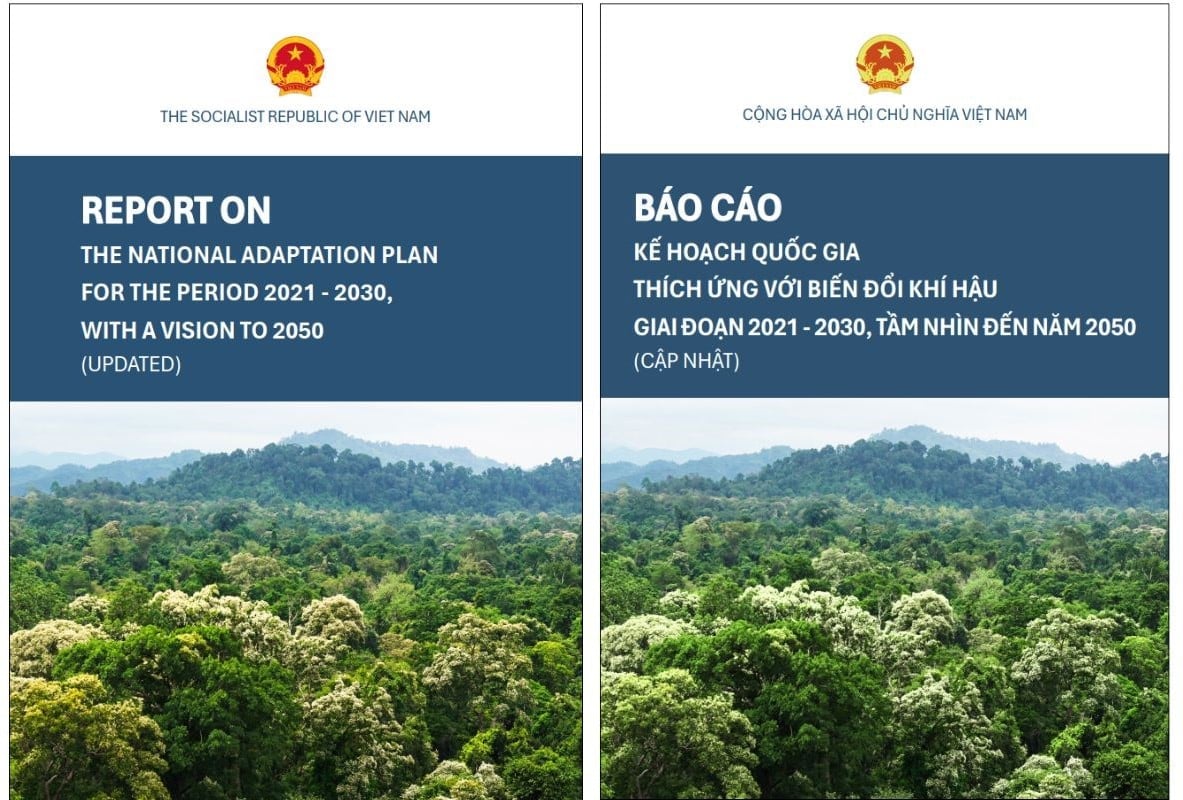
The updated National Adaptation Plan (NAP) for 2021–2030, with a vision to 2050, was submitted by Viet Nam to the UNFCCC. Photo: DCC.
Overall Direction and Key Priorities
Viet Nam has officially become one of 65 countries worldwide to submit its updated National Adaptation Plan (NAP) for 2021–2030, with a vision extending to 2050, to the United Nations Framework Convention on Climate Change (UNFCCC). This action not only fulfills Viet Nam's international obligations but also reaffirms the country’s strong commitment to enhancing resilience against the increasingly severe impacts of climate change.
The updated NAP report for 2025 highlights Viet Nam's dedication to strengthening its climate adaptation capacity. It also emphasizes the importance of promoting international cooperation and mobilizing the necessary resources to implement effective adaptation solutions, contributing to the achievement of the country’s Nationally Determined Contributions (NDCs).
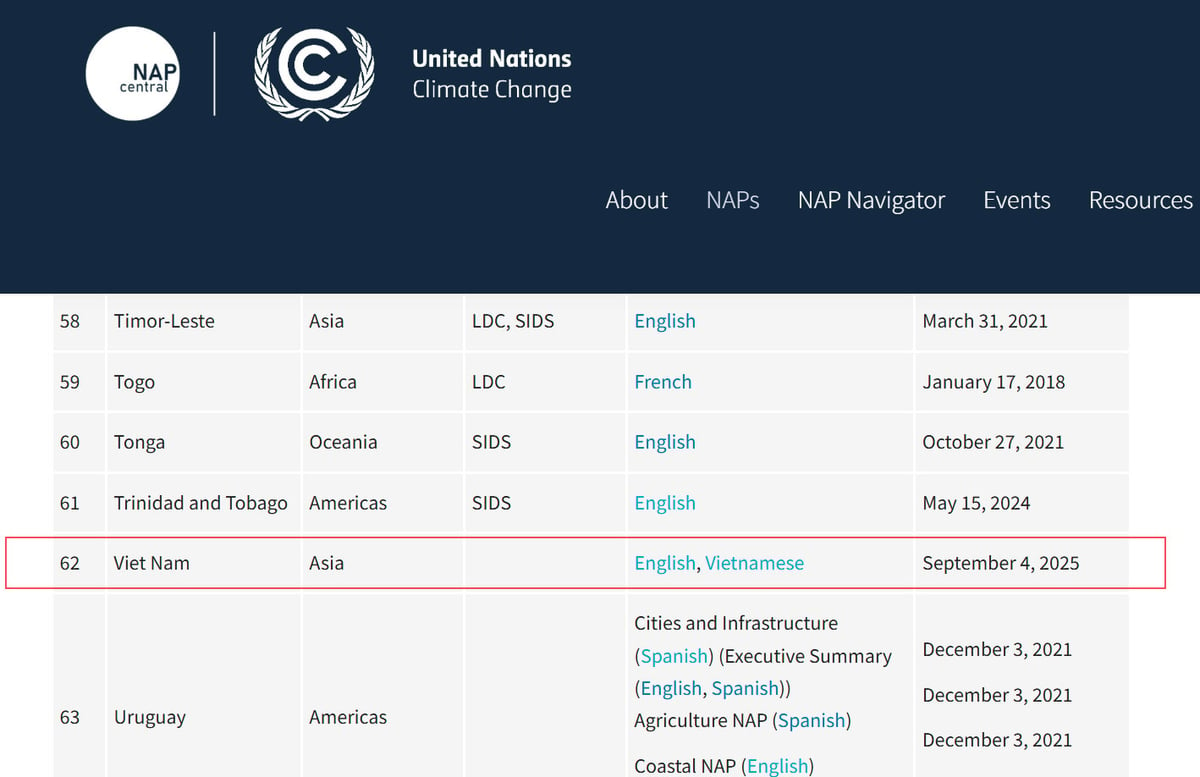
Viet Nam is among the 65 countries that have submitted their reports to the Secretariat of the United Nations Framework Convention on Climate Change (UNFCCC) to date. Photo: Trung Nguyen.
The report emphasizes that Viet Nam is one of the countries most vulnerable to the impacts of climate change. With a geographical position stretching along the coastline, thousands of coastal islands, and a territory mostly consisting of mountainous areas interspersed with densely populated river deltas, Viet Nam faces significant risks from sea level rise and extreme weather events. Climate change has negatively affected various sectors, industries, and localities, directly threatening sustainable development and poverty reduction goals. This situation calls for timely measures to minimize damage and strengthen climate risk management and disaster prevention.
In response to these challenges, Viet Nam developed and issued the National Adaptation Plan for 2021–2030 with a vision to 2050 under Decision No. 1055/QĐ-TTg dated July 20, 2020. Based on practical implementation experience, the Plan was updated and reapproved under Decision No. 1422/QĐ-TTg on November 19, 2024, aiming to further reduce vulnerability and enhance adaptive capacity against the impacts of climate change.

The updated 2025 National Adaptation Plan (NAP) report reflects Viet Nam’s efforts to strengthen climate resilience. Photo: DCC.
In fulfillment of its commitments under the Paris Agreement, the Ministry of Agriculture and Environment led the preparation of the updated 2025 National Adaptation Plan (NAP) report, in coordination with relevant ministries, experts, and international partners.
The introduction of the report provides an overview of the national context, legal framework, and the methodology used in developing the plan. This is followed by a detailed analysis of the climate change situation in Viet Nam, with monitoring data showing that average temperatures are rising faster than the global average, rainfall patterns are increasingly irregular, and there is an increase in the frequency and intensity of extreme weather events.
A key focus of the report is the assessment of achievements and existing challenges in climate adaptation efforts. Viet Nam has made significant progress in policy development, implementation of disaster risk reduction programs, expansion of international cooperation, and raising public awareness. However, the report also identifies several challenges, including the need for further updates to the legal system, limited financial resources, insufficient forecasting and early warning capacities, and limited engagement from communities and the private sector.
The report also details the updated National Adaptation Plan for 2021–2030, with a vision to 2050. The overall objective of the plan is to reduce risks and losses caused by climate change, while enhancing the resilience of natural, economic, and social systems. The plan’s vision clearly integrates climate adaptation as a fundamental and inseparable component of all national development strategies and plans.
Financial Needs and Resource Mobilization Challenges
It is estimated that during the period 2021–2030, Viet Nam will require approximately USD 55–92 billion to fully implement its climate adaptation tasks, equivalent to about 3–5% of its 2020 GDP. However, state budget resources can only cover a small portion of this amount, requiring Viet Nam to mobilize an additional USD 2.7 billion to over 6 billion annually from non-budgetary sources.
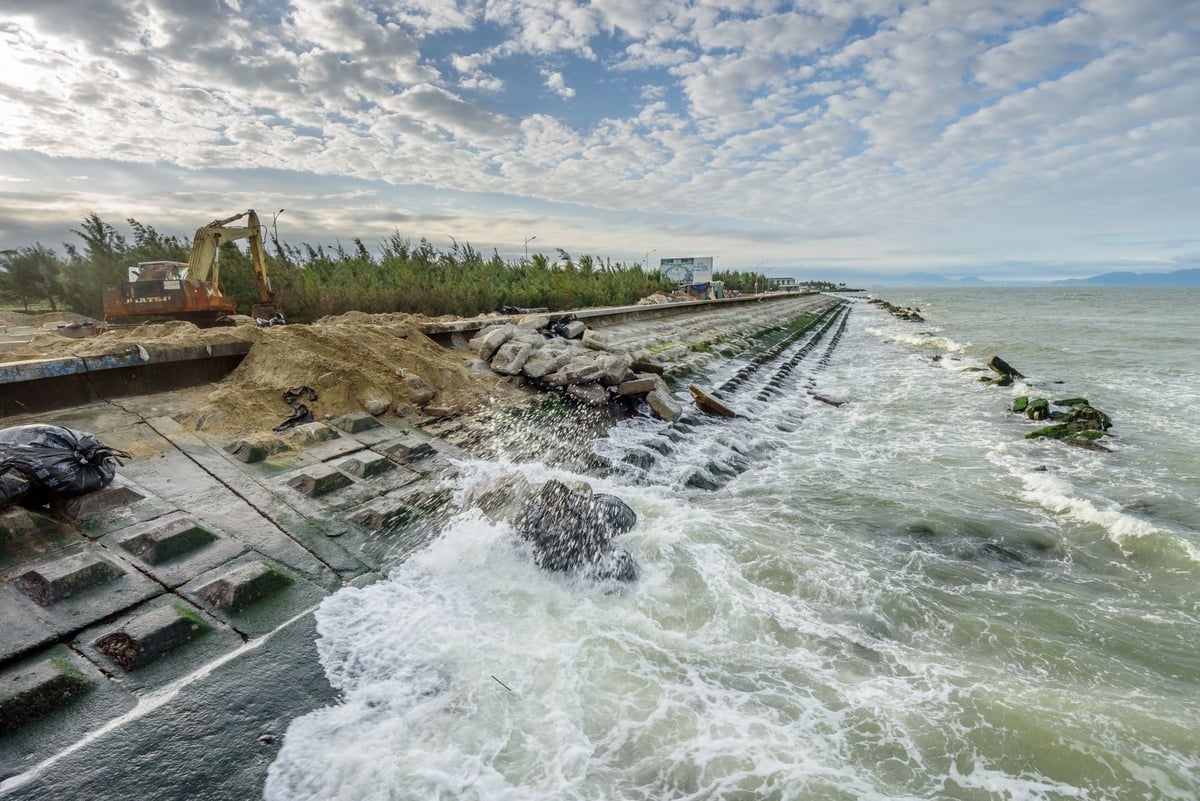
Viet Nam needs around USD 55–92 billion to fully implement climate adaptation tasks during 2021–2030. Photo: DCC.
The financial challenge highlights the critical importance of strengthening international cooperation—not only in terms of funding but also in technology transfer and capacity building. Despite resource constraints, Viet Nam has shown strong determination in addressing climate change by improving policy frameworks, promoting communication and education, expanding international cooperation, and rigorously fulfilling its commitments under the Paris Agreement.
Viet Nam’s submission of the updated NAP report to the United Nations goes beyond fulfilling an obligation; it demonstrates national responsibility, a long-term development vision, and a firm commitment toward a green and sustainable future. It also sends a clear message that Viet Nam is ready to work alongside the international community in responding to climate change with a spirit of sharing, cooperation, and mutual development.
Thuy Linh
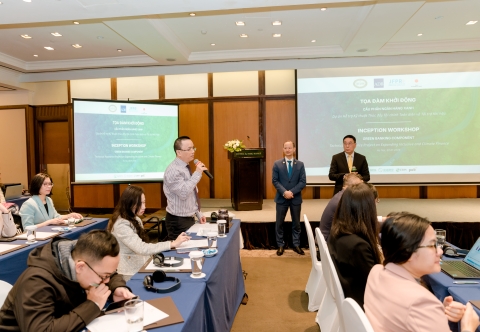 Launch of the Green Banking Component under the Technical Assistance Project on Expanding Inclusive and Climate Finance
Launch of the Green Banking Component under the Technical Assistance Project on Expanding Inclusive and Climate Finance
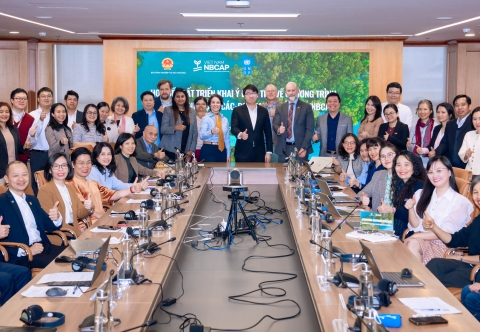 Meeting to propose the implementation of the Letter of Intent for the National Green Carbon Action Partnership Program (NBCAP)
Meeting to propose the implementation of the Letter of Intent for the National Green Carbon Action Partnership Program (NBCAP)